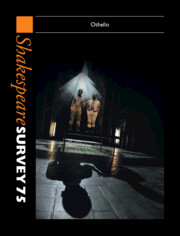Book contents
- Shakespeare Survey 75
- Shakespeare Survey
- Shakespeare Survey
- Copyright page
- Editor’s Note
- Contributors
- Contents
- Illustrations
- Understanding Iago, An Italian Film Adaptation Of Othello: Clientelism, Corruption, Politics
- Circumventing Marginality: The Curious Case Of India’s Othello Screen Adaptations
- Othello’s Kin: Legacy, Belonging And The Fortunes Of The Moor
- ‘More Fair Than Black’: Othellos On British Radio
- ‘This Fair Paper’: Othello And The Artists’ Book
- Othello: A Dialogue With The Built Environment
- ‘[A] Maid Called Barbary’: Othello, Moorish Maidservants And The Black Presence In Early Modern England
- ‘The Moor’s Abused By Some Most Villainous Knave, Some Base Notorious Knave, Some Scurvy Fellow’: Legal Spaces, Racial Trauma And Shakespeare’s The Tragedy Of Othello, The Moor Of Venice
- Ben Jonson’s Sejanus And Shakespeare’s Othello: Two Plays Performed By The King’s Men In 1603
- Iago And The Clown: Disassembling The Vice In Othello
- Pitying Desdemona In Folio Othello: Race, Gender And The Willow Song
- Desdemona’s Honest Friend
- Suffering Ecstasy: Othello And The Drama Of Displacement
- Othello’s Sympathies: Emotion, Agency And Identification
- Warning The Stage: Shakespeare’s Mid-Scene Entrance Conventions
- Looking For Perdita In Ali Smith’s Summer
- Grafted To The Moor: Anglo-Spanish Dynastic Marriage And Miscegenated Whiteness In The Winter’s Tale
- Rhyme, History And Memory In A Mirror For Magistrates And Henry VI
- ‘Bad’ Love Lyrics And Poetic Hypocrisy From Gascoigne To Benson’s Shakespeare
- Viola’s Telemachy
- New Analogical Evidence For Cymbeline’s Folkloric Composition In The Medieval Icelandic Ála Flekks Saga
- ‘But When Extremities Speak’: Harley Granville-Barker, Coriolanus, The World Wars And The State Of Exception
- Shakespeare Performances in England, 2021
- Shakespeare Performances in England, 2021
- Professional Shakespeare Productions In The British Isles, January–December 2020
- The Year’s Contribution To Shakespeare Studies
- Abstracts Of Articles In Shakespeare Survey 75
- Index
Viola’s Telemachy
Published online by Cambridge University Press: 24 August 2022
- Shakespeare Survey 75
- Shakespeare Survey
- Shakespeare Survey
- Copyright page
- Editor’s Note
- Contributors
- Contents
- Illustrations
- Understanding Iago, An Italian Film Adaptation Of Othello: Clientelism, Corruption, Politics
- Circumventing Marginality: The Curious Case Of India’s Othello Screen Adaptations
- Othello’s Kin: Legacy, Belonging And The Fortunes Of The Moor
- ‘More Fair Than Black’: Othellos On British Radio
- ‘This Fair Paper’: Othello And The Artists’ Book
- Othello: A Dialogue With The Built Environment
- ‘[A] Maid Called Barbary’: Othello, Moorish Maidservants And The Black Presence In Early Modern England
- ‘The Moor’s Abused By Some Most Villainous Knave, Some Base Notorious Knave, Some Scurvy Fellow’: Legal Spaces, Racial Trauma And Shakespeare’s The Tragedy Of Othello, The Moor Of Venice
- Ben Jonson’s Sejanus And Shakespeare’s Othello: Two Plays Performed By The King’s Men In 1603
- Iago And The Clown: Disassembling The Vice In Othello
- Pitying Desdemona In Folio Othello: Race, Gender And The Willow Song
- Desdemona’s Honest Friend
- Suffering Ecstasy: Othello And The Drama Of Displacement
- Othello’s Sympathies: Emotion, Agency And Identification
- Warning The Stage: Shakespeare’s Mid-Scene Entrance Conventions
- Looking For Perdita In Ali Smith’s Summer
- Grafted To The Moor: Anglo-Spanish Dynastic Marriage And Miscegenated Whiteness In The Winter’s Tale
- Rhyme, History And Memory In A Mirror For Magistrates And Henry VI
- ‘Bad’ Love Lyrics And Poetic Hypocrisy From Gascoigne To Benson’s Shakespeare
- Viola’s Telemachy
- New Analogical Evidence For Cymbeline’s Folkloric Composition In The Medieval Icelandic Ála Flekks Saga
- ‘But When Extremities Speak’: Harley Granville-Barker, Coriolanus, The World Wars And The State Of Exception
- Shakespeare Performances in England, 2021
- Shakespeare Performances in England, 2021
- Professional Shakespeare Productions In The British Isles, January–December 2020
- The Year’s Contribution To Shakespeare Studies
- Abstracts Of Articles In Shakespeare Survey 75
- Index
Summary
From the earliest days, the Homeric poems have been read as educative models, and in particular the Telemachy of the Odyssey has offered a version of paideia (education, learning) in the moral education of Telemachus, as he is prepared, and prepares himself, to aid his father on Odysseus’ return and, over all, to be a fitting heir. In varying degrees, that theme of educative growth continued through the romance tradition that descended from the Odyssey.1 We teachers of literature have often thought of ourselves as imitating the pedagogical role of Athene and her mortal disguises in the shapes of Mentes and, especially, Mentor, as she provides an educative guide for Telemachus during his process of maturation. Shakespeare the dramatist in some ways participates in this broadly didactic tradition of literature, and indeed he repeatedly studies youth in the process of maturation, from his extended portrayal of Prince Hal in the history plays through his greatly foreshortened but vivid picture of Miranda in The Tempest, although his Mentor figures are perhaps harder to take seriously than his youths. One thinks of such inept pedagogical guides as Holofernes, Falstaff, Polonius and Volumnia. If there is any historicity at all in the legend of Shakespeare as country schoolmaster who turned to playwrighting, that early experience must have left him with considerable scepticism about the pedagogical role of moral guide, to judge from his dramatic portrayals of mentors.
- Type
- Chapter
- Information
- Shakespeare Survey 75Othello, pp. 281 - 286Publisher: Cambridge University PressPrint publication year: 2022

